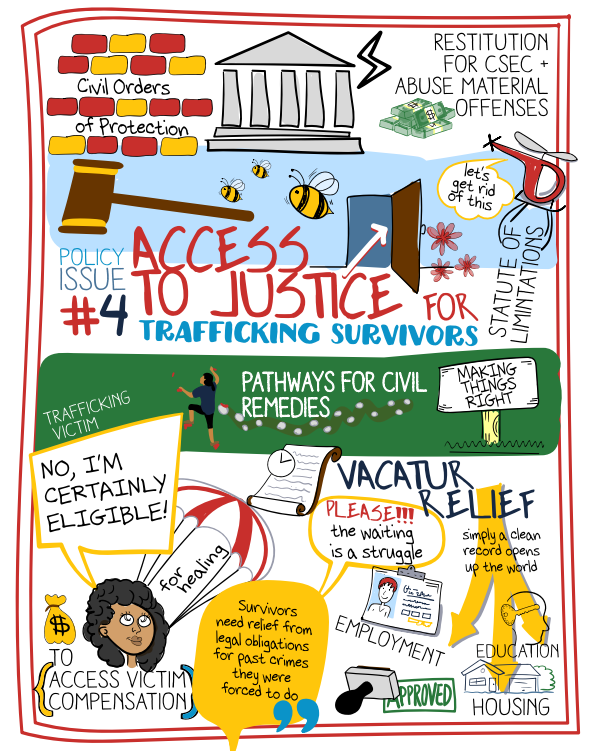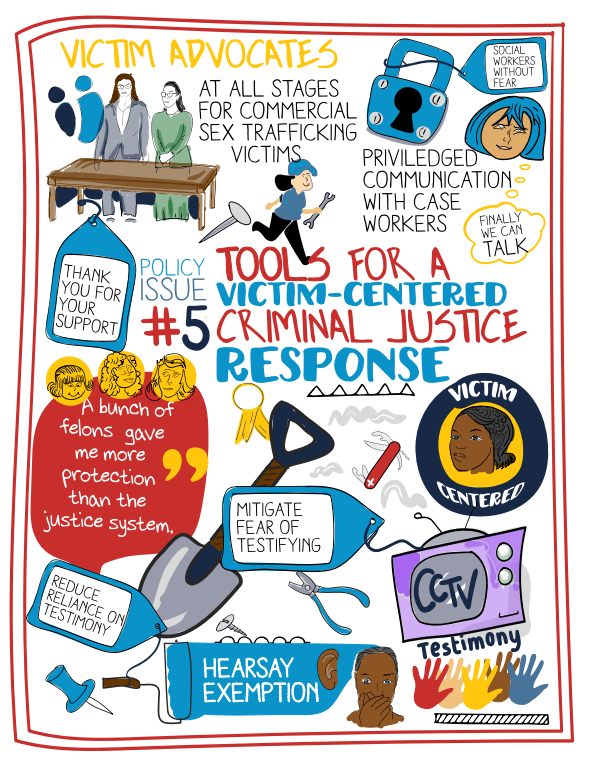As we continue to highlight the six Issue Areas within the Advanced Legislative Framework, we are excited to, once again, draw attention to more victim-centered and trauma-informed responses to ensure survivors receive the support they need following proper identification.
Issue Area #4 focuses on survivors’ access to justice, including creating a pathway to pursuing civil remedies, victim-witness protections, and crime victims’ compensation.
 When survivors are not appropriately recognized in statute, they are often prevented from receiving the services and protections they need to pursue justice and, consequently, experience further harm in trying to move beyond there victimization.
When survivors are not appropriately recognized in statute, they are often prevented from receiving the services and protections they need to pursue justice and, consequently, experience further harm in trying to move beyond there victimization.
Many survivors face financial difficulties because of high legal fees, face obstacles in accessing employment, housing, and more because of crimes they committed as a result of their own victimization (learn more in our Victim-Offender Intersectionality report). Therefore, victims are unable to access justice against their exploiter because of statute of limitations.
Conversely, it is clear that access to justice for trafficking survivors is not only feasible, it is the heart of strong anti-trafficking responses. For example, survivors can receive financial support through restitution, civil claims, and crime victims’ compensation to offset the monetary and non-monetary costs incurred as a result of their victimization, such as health care fees, lost income, and emotional harm. Without financial assistance, survivors will continue to lack access to vital programs to help them heal.
Survivors can also access justice through several additional measures. States should expand current civil orders of protections to trafficking victims, ensuring they have access to vital victim protections commonly limited to victims of intimate partner violence and sexual assault. Further, eliminating the statute of limitations for trafficking and CSEC offenses acknowledges the complexity of trafficking victimization and resulting civil and criminal cases. Lastly, survivors’ own criminal convictions and adjudications should be vacated, recognizing the injustice of criminalizing survivors for crimes committed as a result of their victimization.
To create a stronger path to justice for survivors, Issue Area #5 highlights victim-witness protections that seek to protect and support survivors during criminal justice processes.
 For many survivors of child and youth sex trafficking, trauma continues far beyond the exploitation itself and often throughout the resulting criminal justice response. To build a case against exploiters, survivors are often asked to reshare their experience, often in front of others, without an advocate to support them. To create a more survivor-centered and trauma-centered environment, state laws should provide several alternative mechanisms for survivors to be protected when serving as a victim-witness, ensuring they feel as comfortable and safe as possible when participating in criminal justice processes.
For many survivors of child and youth sex trafficking, trauma continues far beyond the exploitation itself and often throughout the resulting criminal justice response. To build a case against exploiters, survivors are often asked to reshare their experience, often in front of others, without an advocate to support them. To create a more survivor-centered and trauma-centered environment, state laws should provide several alternative mechanisms for survivors to be protected when serving as a victim-witness, ensuring they feel as comfortable and safe as possible when participating in criminal justice processes.
For example, states should contemplate creating a hearsay exception for child and youth sex trafficking victims, allowing certain out-of-court statements to be included as evidence. Victims should also be given the opportunity to share their testimony through closed circuit television, helping shield the victim from the traumatizing impact of physically testifying before many people, including their offenders.
Further, survivors should have access to victim advocates throughout the criminal justice process who can provide key support and protection for the victim, both in and out of the courtroom.
Learn more about Issue Areas #4 and #5 in our Advanced Legislative Framework.
What do to next
- Sign up to become a Grassroots Hero and receive monthly newsletters focused on policy initiatives, legislative wins, and urgent calls-to-action to help victims.
- Contact your state and federal legislators about important bills or issues related to sex trafficking on our Advocacy Action Center.
- Share this blog on social media so others can learn more about how Shared Hope is taking action against child and youth sex trafficking across the United States!
- Join our Facebook Live on October 15 to learn more about our Report Cards! Like our Facebook page to guarantee you get notified when we go live.
- Sign up to receive the Report Cards for Child & Youth Sex Trafficking to be the first to know when your state’s grade is released!






